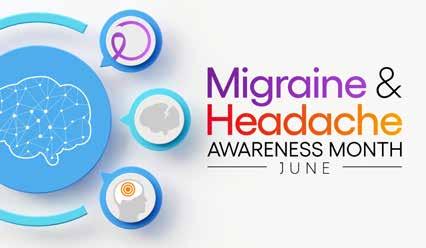
1 minute read
What to Do When MIGRAINES STRIKE
The health and wellness resource Healthline says a migraine is a neurological condition that typically causes painful headaches which are accompanied by other symptoms, such as sensitivity to smell, touch, light, and sound. Migraines also may produce numbness or tingling, visual auras and nausea/vomiting.
The American Migraine Foundation advises that migraine attacks feature distinct phases. Recognition and understanding of these phases can help to manage headaches more effectively. Some of the earliest signs of migraine include fatigue, blurred vision, auras, and other prodrome symptoms unique to people’s migraine histories. These conditions can occur anywhere from a few hours to a few days before a migraine attack. It is important to note that symptoms may not occur with every migraine, nor will early symptoms always result in migraines.
Identifying potential migraine symptoms early may help a person reduce the severity of a migraine. Typically, the migraine headache stage can last for several hours or up to three days, says the AMF. People identify migraine pain as pulsating, throbbing, pounding, per forating, and debilitating. Some have compared it to having an ice pick in serted into the head. The Mayo Clinic notes that these steps may help to re duce the severity of migraine symptoms.
• Find a calm environment away from stressors and the bustle of everyday life.
• Relax in a dark, quiet room as light and sound can exacerbate migraine pain.
• Small amounts of caffeine can relieve migraine pain in the earliest stages and enhance the effects of common OTC pain medications like acetaminophen and ibuprofen. Sip small amounts of caffeinated soda, tea or coffee. Don’t overdo it, as that can lead to caffeine withdrawal headaches.
• Try to get steady, uninterrupted sleep each night. Poor sleep may trigger a migraine. If you have difficulty sleeping, listen to soothing music, establish a bedtime routine, go to bed and wake up at the same times each day (even on weekends), and exercise regularly. Speak with a health care provider if sleeplessness is chronic.
• Eat a healthy, balanced diet at regular intervals. Fasting may contribute to migraine onset. Avoid foods such as aged cheese, alcohol and chocolate if they trigger your migraines.

• Try to manage stress in any way you can, which may include time management and simplifying your life. Delegate to others if you’re taking on too much.
• Journal when migraine symptoms come on so you can determine if there is a trigger.
Migraine headaches can interrupt life and prove debilitating. Finding relief takes patience. If home remedies do not suffice, people can speak to their doctors about possible medical therapies.






